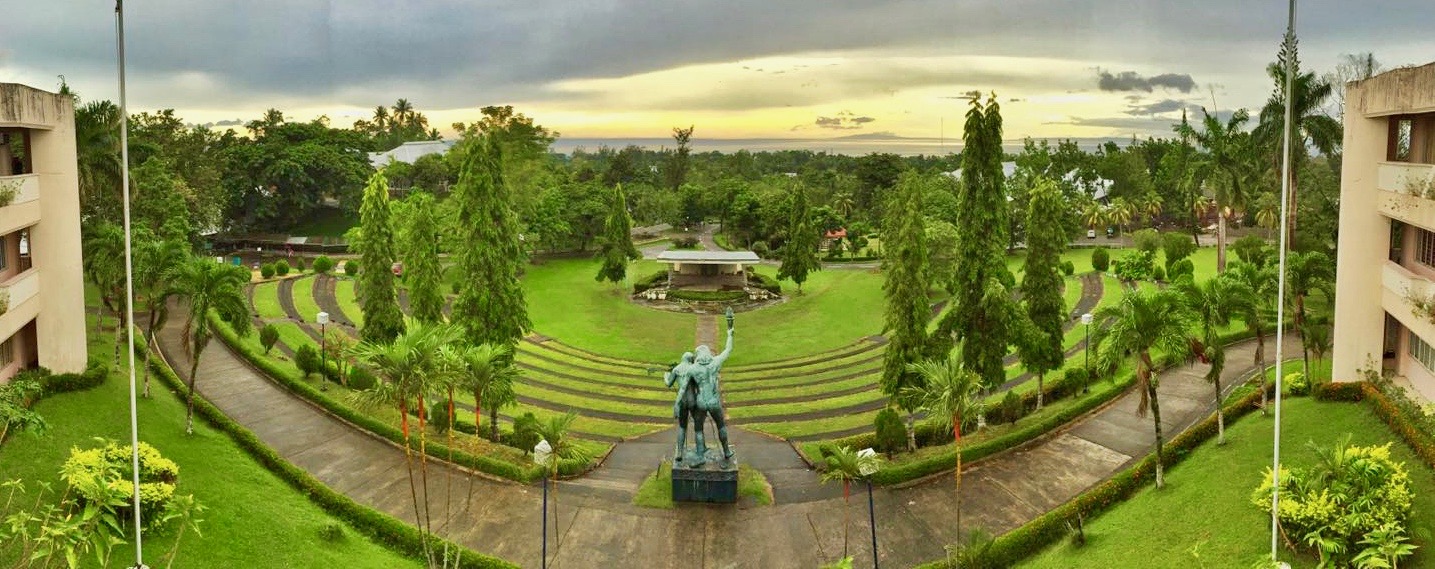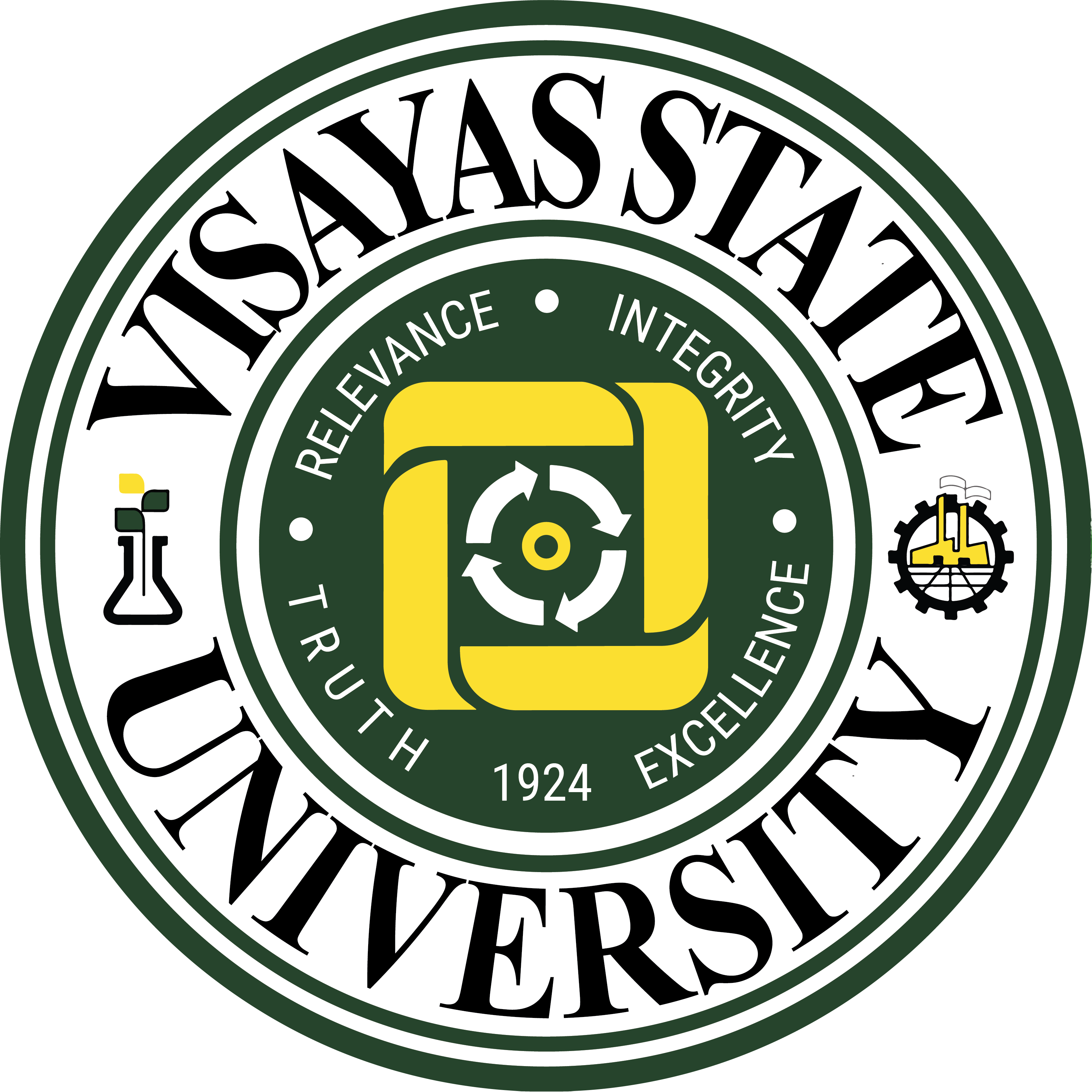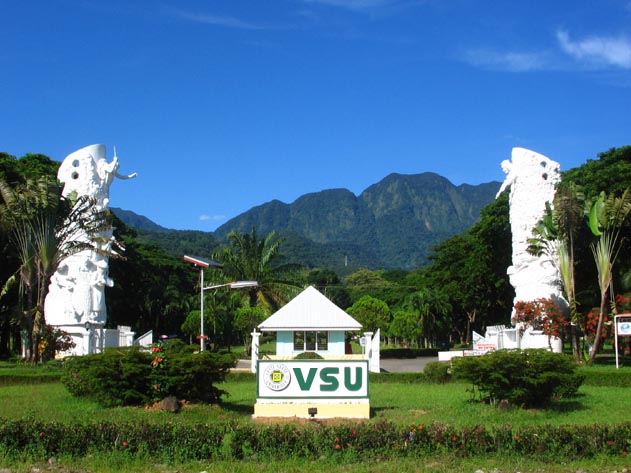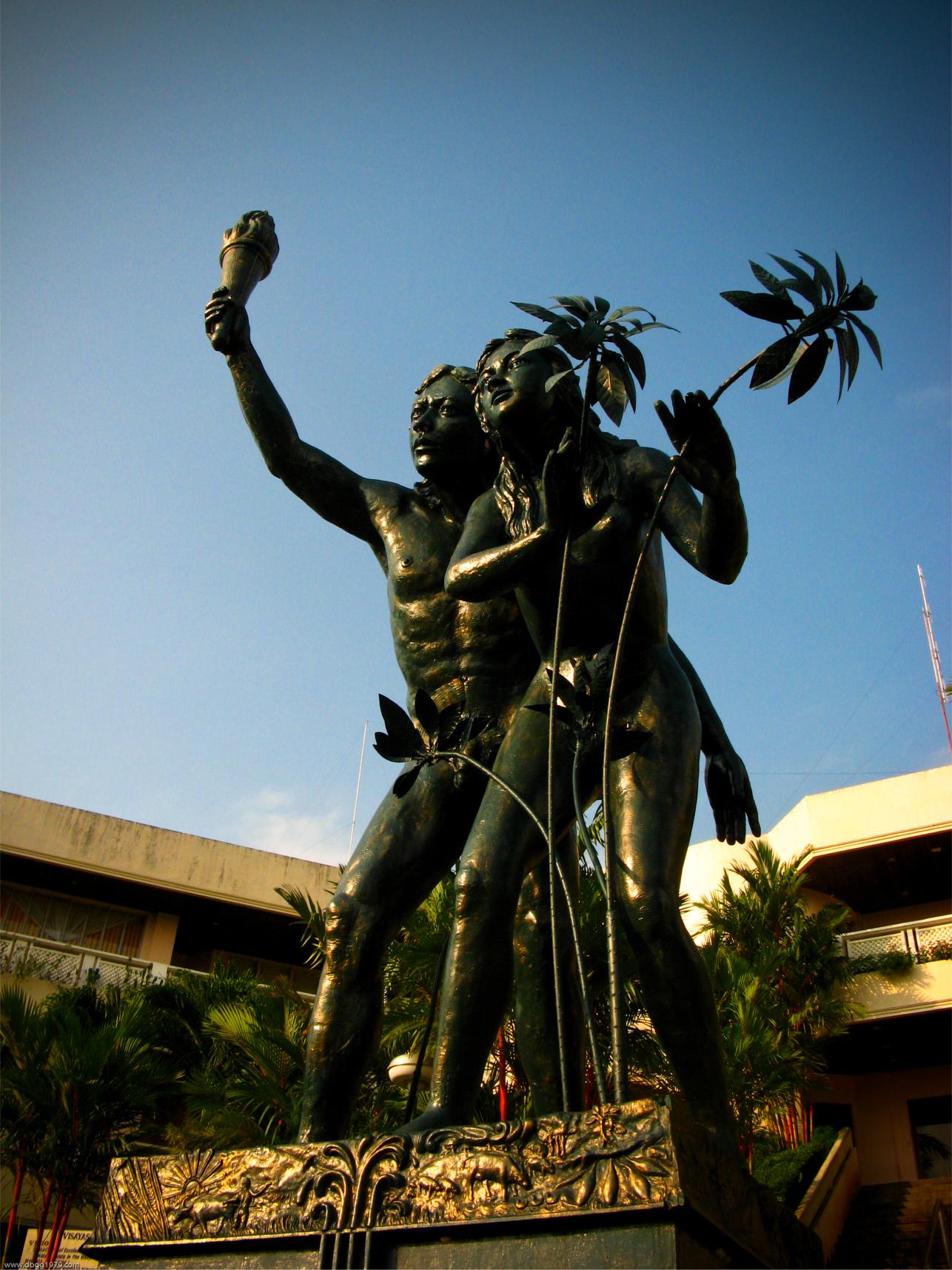Informational
| Core Courses: | |
| AGDE 201 |
RURAL DEVELOPMENT THEORIES AND APPROACHES
Concepts, theories and approaches in rural development and their application in developing countries
|
| AGDE 202 |
PROBLEMS AND ISSUES IN AGRICULTURAL AND RURAL DEVELOPMENT
Social economic, technological, and bio-physical problem and issues in agricultural and rural development with emphasis on Philippine setting
|
| Agronomy | |
| AGRO 141 |
CROPPING SYSTEMS
Principles of Multiple and Monoculture Cropping and their application
|
| AGRO 212 |
FIELD CROP PRODUCTION AND MANAGEMENT
Recent Advances in the Production and Management of Field Crops
|
| AGRO 213 |
MANURING OF FIELD CROPS
Kind and sources of fertilizers and methods of application in relation to growth habits and other plant characteristics
|
| AGRO 214 |
PHYSIOLOGICAL ASPECTS OF CROP PRODUCTION
Physiological processes associated with crop production, plant population and distribution effects, energy transport, storage and regrowth
|
| AGRO 215 |
APPLIED FIELD CROP PHYSIOLOGY
Management and Evaluation of Environmental Factors Influencing Crop Growth and Development
|
| AGRO 241 |
ADVANCED CROPPING SYSTEMS
Recent Advances and Trends in Cropping Systems and Soil-Plant-Atmosphere Relations
|
| AGRO 243 |
ADVANCED FORAGE AND PASTURE MANAGEMENT AND UTILIZATION
Improvement, management and utilization of forage and pasture crops including seed production
|
| AGRO 244 |
ADVANCED CEREAL PRODUCTION
Physiology, nutrition, varietal improvement, and storage of cereals; recent advances and trends in production
|
| Other Courses |
|
| FSYS 121 |
FUNDAMENTALS OF FARMING SYSTEMS
Basic concepts in integrated small farm production systems; factors affecting the productivity of small farms; farming systems research and extension
|
| SOIL 123 |
SOIL FERTILITY AND FERTILIZER
Properties of the solid components of soil; soil sampling and analysis lime and fertilizer requirements; fertilizer analysis, storage, handling and application
|
| SOIL 211 |
ADVANCED SOIL FERTILITY
Properties of soils affecting nutrient availability, fate of fertilizers; reclaiming salt-affected soils; yield potentials
|
| AGBT 117 |
FIELD PLOT TECHNIQUES AND EXPERIMENTAL DESIGN
Statistical procedures and techniques in research
|
| Agricultural Education |
|
| AGED 145 |
PRINCIPLES AND METHODS OF TEACHING AGRICULTURE
Concepts and Strategies in Teaching Agriculture; Class Management and Procedure
|
| AGED 212 |
CURRICULUM PLANNING AND DEVELOPMENT
Curriculum planning and strategies; analysis of school environment in relation to agricultural education curricula
|
| AGED 214 |
COLLEGE TEACHING
Selection and organization of subject matter for specific courses; development of teaching techniques; evaluation of learning outcomes
|
| AGED 232 |
SOCIAL CHANGE AND EDUCATIONAL DEVELOPMENT
Analysis of the theories of social change and their application to social innovations for educational development
|
| AGED 241 |
NON-FORMAL EDUCATION IN AGRICULTURE
Concepts, principles and strategies of non-formal education in agriculture
|
| AGED 242 |
ADVANCED ADMINISTRATION AND SUPERVISION
Concepts, theories, practices and legal basis of administration and supervision under relevance of educational institutions, leadership and educational management
|
| AGED 243 |
PERSONNEL ADMINISTRATION
Effective Personnel Administration in Relation to Quality of Education: Interpretation and Analysis of Civil Service Rules and Regulations
|
| PROFED 121 |
PRINCIPLES OF EDUCATION
Basic philosophical, psychological, and sociological principle underlying the educative process
|
| PROFED 122 |
EDUCATIONAL PSYCHOLOGY
Teaching-learning behavior as applied to school setting, specifically the study of how students learn and how to teach them optimize their acquisition of learning
|
| PROFED 134 |
TEST, MEASUREMENT AND EVALUATION
Principles and concepts in educational tests, measurement and evaluation, statistics used in interpreting test
|
| ADED 211 |
ADVANCED EDUCATIONAL PSYCHOLOGY
Psychological theories and principles underlying the learning process
|
| Agricultural Extension |
|
| AGEX 132 |
PRINCIPLES, METHODS AND STRATEGIES IN EXTENSION
Application of selected concepts, principles, methods and strategies in education that are commonly used in non-formal setting most especially concerning the disadvantaged rural population
|
| AGEX 136 |
RURAL LEADERSHIP AND GROUP DYNAMICS
Theories and trends in rural leadership and application of group dynamics in solving rural problems
|
| AGEX 215 |
RURAL SOCIAL SYSTEM
Rural Organizations: Their structures, functions and effectiveness in meeting the needs of the rural people
|
| AGEX 217 |
TEACHING FARMERS CLASSES IN AGRICULTURE
Organizing and promoting farmer classes; course planning; instructional procedures; follow-up and evaluation
|
| AGEX 218 |
EXTENSION STRATEGIES FOR RURAL DEVELOPMENT
Extension Strategies for Rural Development Applicable on Developing Countries
|
| AGEX 233 |
COMMUNICATION IN EXTENSION
Application of Concepts and Principles of Communication in Extension education
|
| AGEX 234 |
PARA-PROFESSIONALS IN ADULT EDUCATION
Concepts, principles, methods and procedures useful to adult education teachers in working with paraprofessionals
|
| AGEX 244 |
EVALUATION IN ADULT EDUCATION
Concepts and problems in adult education and community development, construction and use of evaluation device
|
| AGEX 246 |
LEADERSHIP AND ORGANIZATION
Leadership behavior and group processes in formal organizations; socio-psychological approaches to effective organizations
|
| Other Courses |
|
| ADED 222* |
SOCIAL SCIENCE RESEARCH
Selection of research problems, designing, conducting and reporting of social science research
|
| STAT 221 |
SOCIAL SCIENCE STATISTICS
Statistical Tests and their application to social science research
|
| Animal Production |
|
| ANHT 120* |
APPLIED ANIMAL HEALTH
Prevention and control of common animal pests
|
| ANSC 133 |
DAIRY PRODUCTION
Feeding care and management of dairy animals, hygienic production of milk
|
| ANSC 141 |
FEEDS AND FEEDING
Composition and use of feeds; formulation of rations, feeding practices and strategies; and feedmill operation
|
| ANSC 210* |
POULTRY PRODUCTION AND MANAGEMENT
Systems of poultry production, problems and management practices; factors affecting cost and return
|
| ANSC 212 |
ADVANCED SWINE PRODUCTION
Recent trends and advances in the systems of swine production; management practices; feasibility studies and problems
|
| ANSC 220* |
SWINE PRODUCTION AND MANAGEMENT
Systems of Swine Production; Problems and Management Practices; Factors Affecting Costs and Returns
|
| ANSC 221 |
ADVANCED POULTRY PRODUCTION
Recent trends in poultry production; management practices and problems; feasibility studies
|
| ANSC 230* |
RUMINANT PRODUCTION AND MANAGEMENT
Principles and practices of beef, carabeef, chevon, and mutton production; marketing; and waste utilization
|
| ANSC 242 |
NON-RUMINANT NUTRITION
Physiology of monogastric digestion and absorption; metabolism of nutrients and their effects in animal production
|
| ANSC 243 |
RUMINANT NUTRITION
Physiology of Ruminant Digestion and Absorption:Metabolism of Nutrients and thier effects on Animal; Performance
|
| ANSC 251 |
ADVANCED ANIMAL BREEDING
Current and potential breeding systems; development of selection indexes
|
| ANSC 252 |
REPRODUCTIVE PHYSIOLOGICAL OF FARM ANIMAL
Physiology and functional inter-relationship of parts of the reproductive systems, causes and techniques of improving reproductive efficiency in farm animals
|
| Language Teaching |
|
| LTNG 205 |
RELATED ACTIVITIES IN LANGUAGE TEACHING
Conducting grammar and oral speech review, supervision elocution contests, directing plays, and advising school paper
|
| LTNG 207 |
INTRODUCTORY LINGUISTICS
Acquire basic ideas of language and linguistics as well as distinguish the relationship between them
|
| LTNG 209 |
SECOND LANGUAGE TEACHING FOR SPECIAL CURRICULAR PROGRAMS
Acquisition of a second language in the Philippines equates with acquiring a learning tool to explore knowledge in school
|
| LTNG 212 |
TECHNIQUES IN ADVANCED COMPOSITION
Writing and guiding the writing of essays and library term papers
|
| LTNG 218 |
TECHNIQUES IN ADVANCED COMPOSITION
Writing and guiding the writing of essays and library term papers
|
| LTNG 218 |
SOCIOLINGUISTICS
The study of language and society
|
| LTNG 225 |
PHSYCHOLINGUISTICS
Theories and principles of language acquisition and learning from integrated perspective of the linguist and psychologist
|
| Agricultural Economics |
|
| AGEC 112 |
COOPERATIVES
Different types of cooperatives, concepts, principles and practices, problems and developments in the Philippines
|
| AGEC 114 |
MARKETING OF AGRICULTURAL PRODUCTS
Principles of marketing agricultural products; description of types and functions of marketing organization and market channels for agricultural products
|
| AGEC 231 |
PROJECT FEASIBILITY STUDIES
Project identification; selection and preparation of market; technical, financial and management studies
|
| AGEC 244 |
ECONOMICS OF AGRICULTURAL MARKETING
Application of economic theories to marketing of agricultural inputs and products: systems analysis of agricultural markets
|
| Development Communication |
|
| DEVC 141 |
SCRIPT WRITING AND PROGRAM PLANNING FOR COMMUNITY RADIO
Script writing and program planning for community radio
|
| DEVC 213 |
COMMUNICATION AND DEVELOPMENT
Interpersonal and mass communication systems in developing societies, their nature, functions and interrelationships with other factors relevant to development
|
| Food Science and Technology |
|
| FTEC 163 |
SENSORY EVALUATION OF FOODS
Methods in sensory evaluation; consumer testing and acceptance patterns
|
| FTEC 234 |
FOOD-BORNE INFECTION AND INTOXICATION
Common infection and intoxication of food origin, their signs, symptoms and control
|
| FTEC 251 |
ADVANCED MEAT AND POULTRY PROCESSING
Recent concepts related to physical, chemical and microbial changes occurring in meat and poultry products during processing
|
| Plant Protection | |
| PPAT 111* |
GENERAL PLANT PATHOLOGY
Cause and nature of plant diseases, pathogenicity and spread, disease control
|
| PPRT 206* |
INTEGRATED PEST MANAGEMENT
Integrated approaches in pest management; recent trends and issues in the development of pest control strategies
|
| PPRT 284* |
BIOLOGICAL TRANSMISSION OF PLANT PATHOGENS
Fundamental Processes involved in biological transmission of plant pathogens by insects and other organisms
|
* Lecture only: 1 unit laboratory must be taken on-campus
# Offered to bothAg.Ed and Ag. Ext. students
The Open University (OU) at VSU aims to provide quality distance-study programs in agriculture and allied fields through distance learning to government employees and other individuals engaged in agriculture and rural development activities.
 Learning Resources
Learning Resources
The OPEN UNIVERSITY (OU) offers Master of Agricultural Development (M.Ag.Dev), a non-thesis masters' degree program with the following fields of specialization:
Major
- Agricultural Education
- Agricultural Extension
- Agronomy
- Animal Production
- Language Teaching
Minor
- Agricultural Economics
- Development Communication
- Food Science and Technology
- Plant Protection
Interested parties may opt to take either of the following schemes: SCHEME A (Annual) and SCHEME B (Semestral)
Applicants seeking admission for graduate study at VSU must be a holder of a baccalaureate degree with a Grade Point Average (GPA) of at least 2.00 and 1.75 or equivalent for applicants in the master's and doctoral programs, respectively. However, applicants with a GPA lower than the prescribed rating may be admitted on a probationary status. Applicants are also required to submit the following requirements:
- Accomplished application forms (FM-OGS 01);
- Candid Appraisal from at least two (2) persons, former professors and a supervisor (FM-OGS 02);
- Transcript of Records from the last school attended (Further Studies Indicated Purpose)
- A non-refundable application fee of P100.00 or $10.00 may be deposited through bank transfer to the Visayas State University Land Bank of the Philippines Account (Acct. Name; VSU FUND 164 Acct. No. 3572 1000 13);
- Certificate of English Proficiency or an acceptable score in TOEFL for international graduate student applicants;
- Seven (7) copies of Personal History Statement (PHS) and notarized affidavit of support authenticated by the Philippine Mission Abroad (PMA) for international graduate student applicants. PHS forms can be secured by the University Registrar or the PMA.
- NSO Birth Certificate
For International Graduate Students, kindly have all of your original documents Apostille in the Philippine Embassy nearest to your home country.
Kindly send all of your complete and original requirements to our office with the address at the Office of the Dean of Graduate School, Visayas State University, Baybay City, Leyte, 6521.
Application with incomplete documents shall not be entertained, so please comply with all the necessary documents before submission.
NOTE: All SIGNATURES in all forms should be accomplished using a BLUE ball pen.
|
Distribution
|
Master of
Agricultural
Development
(M.Ag.Dev.)
|
Master of
Education
(M.Ed)
|
Master of
Science
(M.S.)
|
Doctor of
Philosophy
(Ph.D.)
|
| Major Field | 25 | 18 | 21 | 21-35 |
| Minor Field | 9 | 9 | 9 | 12 |
| Core courses | 6 | 15 | - | - |
| Thesis/Dissertation | - | - | 6 | 12 |
| Special Problem | 2 | - | - | - |
| Graduate Seminar | 1 | - | 1 | 1-2 |
| Foreign Language/Special Skills | - | - | - | (b) |
| Total (minimum) Course Work | 42 | 42 | 37 | 46-61 |
Tuition and other fees

VSU offers a unique opportunity for advanced study through highly innovative and relevant graduate programs covering a wide range of disciplines relating to agricultural and rural development.
Students make use of extensive instructional and research facilities of the academic as well as of various VSU-based research centers. The University also provides general amenities including housing, social, recreational, spiritual and shopping facilities. The scenic campus is situated at the foot of Mt. Pangasugan and facing the beautiful Camotes Sea, making VSU a conducive place for study.
The University regularly updates its program to keep pace with the ever-changing needs of students and to ensure an atmosphere for optimum academic advancement.

The VSU Graduate School strives for excellence in graduate education for regional growth and rural development. It offers graduate courses to teachers, researchers, extensionists, administrators and other professionals to upgrade their educational competencies. It also offers weekend classes and distance education for those who do not have enough time to attend to the conventional schedule.
Philosophy. A teacher must foster intellectual curiosity among students and train them in the art and science of searching for truth to achieve excellence whether in the classroom or in the laboratory, in nature or in society
Vision. Center of excellence in advanced education and research in agriculture and allied fields in the Visayas.
Mission. Attainment of the highest quality of human capital and scientific research in advanced education for the sustained growth and development of agriculture, fisheries, and agro-industries in the Visayas.
Goal. Produce high-quality manpower in agriculture and its allied fields through graduate education to serve the development needs of the region.
General Objective. To strive for excellence in graduate education for regional growth and rural development.
Specific Objectives
- To offer graduate courses to teachers, researchers, extension workers, administrators, and other professionals.
- To train and guide graduate students in conducting productive and independent research studies relevant to agriculture and its allied fields.
- To design and implement innovative strategies for the enhancement of managerial and leadership skills of professional and development workers.
- To strengthen the personal discipline and moral character of graduate students to better serve their clientele.

Master of Agricultural Development (MAgDev) in:
Master of Science (MS) in:
- Agricultural Economics
- Agricultural Education
- Agricultural Extension
- Agronomy
- Animal Science
- Botany
- Development Communication
- Development Sociology
- Entomology
- Food Science and Technology
- Forestry
- Horticulture
- Language Teaching
- Land Administration Management
- Plant Pathology
- Plant Protection
- Soil Science
- Tropical Ecology
- Weed Science
Master of Management (MM) in:
Master of Education (MEd) in:
Diploma/Master/Master of Science in Land Administration and Management
Registration periods for the semester and summer terms are reflected in the academic calendar for each school year.
Each student is assigned an academic adviser who shall assist the student in programming his study load and monitor his academic performance every semester.
Every prospective student must enroll during the prescribed registration period. Detailed instructions on enrollment procedures are posted at enrollment time. No enrollment is possible without the necessary credentials. Enrollment by proxy is not allowed.
Bonafide Students. Considered a bonafide student of the University is one who is duly enrolled; that is, who has submitted his valid credentials, has attended classes, and has paid his fees or made arrangements for payment with the University.
Changing of Subjects. During the enrollment period a student may, with the approval of the academic adviser and the department head, change subjects by accomplishing an application for changing of subjects. Changes are not permitted after the close of the official enrollment period.
Dropping of Subjects. With the knowledge of the instructor in the subject and consent of the academic adviser and the department head, a student may drop a subject by accomplishing an application for dropping of subjects provided he has not dropped due to absences. If the dropping takes place after 75 percent of the hours prescribed for the subject has elapsed, the instructor concerned shall be requested to state on the form whether the student shall be dropped without a grade or given grade of "5" on the basis of his class standing for that subject.
The approved forms should be filed with the Registrar's Office for record purposes. Any student who does not follow this procedure shall be given a grade of "5".
Adding of Subjects. A student may add a subject within one week after the opening of classes by accomplishing an application form for adding of subjects and securing the signature of the instructor concerned. Recommendation from the academic adviser and approval of the department head must be secured.
Shifting of Courses. A student may change course or shift from one course to another by accomplishing a prescribed form. No student is allowed to change curriculum without the favorable recommendation of the different signatories in the application form.
Certificate of Transfer Credential (Formerly Honorable Dismissal)
A student who desires to transfer to another school should apply for a certificate of transfer credential. Such certificate will be issued after the applicant has been cleared of all financial and property liabilities to the University.
** However, no certificate of transfer credential shall be issued unless a written request from the student noted by the parent or guardian and approved by the Registrar is presented.
Leave of Absence
A leave of absence not exceeding one academic year may be granted to a student upon presentation of a written petition noted by the parent or guardian to the Registrar stating the reason for the leave.
Withdrawal from the University without a formal leave of absence shall be ground for the curtailment of registration privileges.
Cross Enrollment
(Section 288 - 289, Chapter 42, Visca Code) No Student may enroll simultaneously in two schools without the prior approval of the Registrar. Violation of this rule may cancel the student's right to receive credit for work done in either of the schools.
Permission for cross enrollment is issued by the Registrar upon recommendation of the Dean concerned and only if the applicant is a candidate for graduation during the school year and the course is not offered during the school year in the University or if the subject required for graduation is a conflict with the other subjects.
The maximum number of units for which cross enrollment is ordinarily permitted is six (6) units during the regular term and three (3) units during summer term.
For those coming from other schools, they need to submit a permit to study duly signed by their Registrar.
Summer Study in Another School
A student in the university may enroll in another school during summer session and obtain credit in VSU only upon the prior recommendation of the Dean provided such school is an accredited by AAACUP/PAASCU and other related accrediting agencies.
No permit to study in another school during Summer will be granted for the following:
- Any subject in which the student failed in VSU.
- Any major, specialized or professional subject, in any curricular year.
The VSU (main campus) is situated in Barangay Pangasugan, 8 km north of the City of Baybay, Leyte and 34 km south of Ormoc City. It is accessible from both directions because the national road cuts across the University campus. It can also be reached from various points in Leyte either by air through Tacloban City airport (116 km away) or by sea through the ports of Baybay City, Ormoc City, Hilongos (43 km), and Bato (50 km).
Manpower Capabilities
As of January 2002, the VSU main campus had a total of 261 faculty members (95 PhDs, 115 MS, and 51 BS), 175 (67%) of whom had permanent employment status. Some (52) members of the faculty were detailed in research centers and two were on secondment.
There were 296 (1 Ph.D., 15 MS, 126 BS, 44 graduate of certificate courses, 30 college level, 71 high school level, and 9 elementary level) regular administrative staff.
Physical Features
The VSU-Main Campus has a total land area of 1,099.4 hectares that extends from the shore of Camotes Sea to the top of Mt. Pangasugan. It comprises the following:
- Campus Grounds - 61.6 ha.
- Research/Experiments - 94.0 ha.
- Instruction - 3.0 ha.
- Production Area - 104.3 ha.
- Pasture Area - 114.0 ha.
- Forest Reservation - 574.2 ha.
- Coconut - 62.3 ha.
- Abaca - 25.0 ha.
- Rice - 7.0 ha.
- Orchard - 5.0 ha.
- Corn - 3.0 ha.
- Coffee - 2.0
- Roads, Creeks/Marshy Areas - 44.0 ha.
Buildings
The University main campus has 188 buildings: 21 student dormitories, 75 staff houses, 17 academic buildings, 2 Administration buildings, and 63 others which include the Main Library, Student Union, Convention Center, Center for Continuing Education, Infirmary, Guesthouse, Hostel, Pavilion, Cebu and Manila offices, market, cafeteria, high school, elementary, workshop, DA auxiliary, gymnatorium, marine laboratory, fuel depot, powerhouse, motor pool, garage, nurseries, barns, and 9 research/training centers as follows:
- Philippine Root Crop Research and Training Center (PRCRTC)
- National Abaca Research Center (NARC)
- National Coconut Research Center (NCRC) - Visayas
- Farm and Resource Management Institute (FARMI)
- Institute for Strategic Research and Development Studies (ISRDS)
- Philippine Carabao Center (PCC) - Leyte
- Agricultural Training Institute-National Training Center (ATI-NTC) - Visayas
- Multi-Media Development Center (MMDC)
- Institute of Tropical Ecology and Environmental Management (ITEEM)
The VSU Colors
The VSU colors are green and gold. Green represents nature and the freshness of approach in any academic venture including production or collaboration; gold for the resources and achievements because of excellence in all its endeavors.
The VSU Seal

The circular seal of the University bears the university's name, colors, the years 1924 when the institution was established, a flask with a plant in it on the left side symbolizing agriculture and other fields, and industry. The four interlocking columns forming a square at the middle of the seal depict the four major functions of the University which are instruction, research, extension, and production; and the arrows at the core indicate the basic principles essential to VSU's growth, which are creativity, mutual cooperation, dynamism, and systems approach in problem solving.
The VSU Emblem
The VSU emblem bears the VSU colors and seal and heralds the University's chartered existence, dedication, and strong commitment to education.
The Twin Obelisks

The twin white obelisks at the Main Campus entrance are among VSU's important landmarks that symbolize the academic programs and rural development mandate of the University.
Both structures depict VSU's acknowledgement of providential intervention in pursuit of its programs. The obelisk at the south bears an image of the "god of the sun" and represents the field of agriculture and allied fields. The other obelisk with the "god of lightning and thunder" represents the technology and innovation in all its endeavors.
The Search for Truth
 The Search for Truth Statue in front of the Administration Building consists of two gigantic nude figures of a man and a woman, emphasizing partnership in the quest for truth, knowledge, and the professions. Nakedness symbolizes boldness, impartiality and unemcumbered drive in seeking for truth in its academic pursuits. The statue with inscription at its footstall was conceptualized by Dr. Fernando A. Bernardo, the first President of the Visayas State College of Agriculture.
The Search for Truth Statue in front of the Administration Building consists of two gigantic nude figures of a man and a woman, emphasizing partnership in the quest for truth, knowledge, and the professions. Nakedness symbolizes boldness, impartiality and unemcumbered drive in seeking for truth in its academic pursuits. The statue with inscription at its footstall was conceptualized by Dr. Fernando A. Bernardo, the first President of the Visayas State College of Agriculture.
The inscription reads as follows:
"Let search for truth prevail as a dominant activity of university life. For truth is the guiding light in our paramount mission: the pursuit of excellence.
A teacher must foster intellectual curiosity among students and train them in the art and science of searching for truth to achieve excellence - whether in the classroom, in the laboratory, in nature, or in society."
- Identified by the Commission on Higher Education (CHED) as Center of Excellence in Agriculture, Agricultural Engineering, and Forestry (2000) and Zonal Research Center in Region 8 (2000-2003)
- Accredited by the Bureau of Immigration to accept international students into its degree programs (2000)
- Professional Graduates from SY 1953-1954 to SY 2000-2001 totaled 8,522
- Accredited Level II (Enhanced Accredited Status) in Agriculture and Graduate Education Programs by the Accrediting Agency of Chartered Colleges and Universities in the Philippines Inc. (AACCUP) (1999)
- Chosen by CHED as Learning Center for the Massive Upgrading of College Instructors Program for the western part of Leyte, Southern Leyte, and Biliran Provinces since 1998
- Accredited by the Civil Service Commission (CSC) to act on the approval of appointments of personnel and employees since 1994
- Gintong Ani Awardee of the Department of Agriculture (1988)
- Granted a New Zealand Government Technical/Fund Support for the Extramural Program for Rural Development (EPRD) (1985)
- Tanglaw Awardee from the Philippine Council for Agriculture, Forestry, and Natural Resources Research and Development (PCARRD) (1977 and 1980)
- Lead Institution of the Visayas Consortium of Agricultural Resources Program (VICARP) since 1978
- Granted a World Bank (WB) Agricultural Support Fund (1976)
- Multi-commodity research center in the Visayas since 1975
- Zonal Agricultural University in the Visayas since 1975

